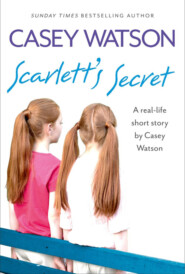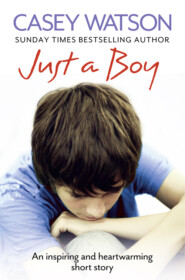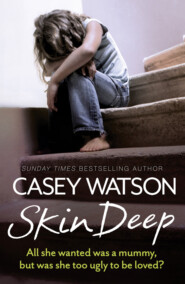По всем вопросам обращайтесь на: info@litportal.ru
(©) 2003-2024.
✖
Too Hurt to Stay: The True Story of a Troubled Boy’s Desperate Search for a Loving Home
Настройки чтения
Размер шрифта
Высота строк
Поля
It was a full 20 minutes before Mike was back downstairs. ‘Well, I don’t know if it’s done any good,’ he said, ‘but he did apologise.’
‘And did he say why he’d done it?’
Mike shook his head. ‘Just sat and listened to me, mostly,’ he answered. ‘Then said sorry, and that it wouldn’t happen again. I did ask why he’d done it – that he must have known it was wrong – but he had no answer. Just said he didn’t know.’
‘Is he coming down for tea, then?’ I asked, beginning to dish out the bolognaise that I’d finished preparing while Mike had been upstairs.
‘On his way. I just told him to wash his face and hands and come straight down. Oh, and I did tell him that he wouldn’t be getting all his behaviour points today, so no TV or DS tomorrow. He seemed to accept that.’
It seemed Mike was right. Spencer was quiet and a bit sullen looking as he sat and ate his tea, but I was at least pleased to see he looked chastened. And after tea, when he went back upstairs to play with his toy dinosaurs, we both agreed that, however destructive the hole-making and the stealing, it at least gave us a chance to see what we were dealing with, and a benchmark from which to improve.
But the sense of contrition wasn’t destined to last long. At around nine, when Spencer came down for a drink and a biscuit, I decided I’d take the opportunity to have a quick run through his points with him, just so he knew how things stood. This was important. The whole point and reward system was new to him, and almost as important as the business of actually earning them was that the child make the connection between actions and consequences; that was the foundation on which the whole model was based.
At first, as I explained about the deficit and its consequences for privileges tomorrow, he seemed resigned and accepting. ‘That’s okay,’ he said meekly. ‘I know there’ll be no TV time tomorrow.’
‘And I’ll also have to ground you. You do know that, too, don’t you? So there’ll be no playing out for the next few days.’
Though I’d mentioned it, I’d assumed this would be inconsequential – Spencer hadn’t once yet asked to go out to play. But I couldn’t have been more wrong. He almost harrumphed. ‘What?’ he said. ‘I thought my punishment was no TV?’
‘No, love. It’s not your punishment. It’s that you can’t afford to buy it. You can’t afford to buy TV time because you won’t have enough points. If you did, then you’d still be able to buy TV time, wouldn’t you? No, your punishment is not being allowed to go out to play. You know that. We went through all that at the start, remember?’
His expression hardened. ‘But that’s crap! That’s like punishing me twice.’
I shook my head. ‘Spencer, I don’t even see why this is bothering you – you haven’t been out to play. You’ve not even wanted to.’
He folded his arms across his chest. ‘But I was going to! And now I can’t. Is that what you’re saying?’
It felt like I was talking to a tiny politician. A very cross one. ‘Yes, love, it is,’ I confirmed. ‘For this week, at least.’
‘God, that’s so unfair!’
I was still shaking my head in disbelief as he stomped back off up the stairs, but as the days passed it became clear that this wasn’t about playing out. For Spencer, it was a matter of principle. He simply wouldn’t let it rest, mumbling to himself about it constantly, and going off on one about ‘injustice’ half a dozen times a day. By the time Wednesday came around and he was due back at school, I couldn’t have been happier. Perhaps now we’d see the end of it.
But school, it seemed, was just another irritant in his life. Just another thing to ruin his day.
‘I hate school,’ he told me, after I’d nagged him about the time for the umpteenth time. ‘And my teacher,’ he added as he climbed into the back of the car.
‘Oh, you’ll be fine once you get there,’ I said, wincing as he slammed the car door, for good measure. ‘Once you see your friends again, you’ll see. It’s always a bit nerve-racking after the long summer holidays. But once you’re back … tell you what. Shall I put a CD on? Some music to take your mind off things maybe?’
This seemed to cheer him up. ‘I’ve got one,’ he said, brightening. ‘Here.’ He passed me a CD he’d fished out of his backpack. ‘It’s my favourite. It’s the Chipmunks.’
It was, too. For the next 15 minutes all conversation was halted as he hummed along to some frankly bizarre, squeaky renditions of a bunch of pop songs I’d never even heard before. But it did seem to have worked, because as we turned into the school car park his mood seemed to have brightened considerably.
It was one of those balmy September days that just seem perfect for starting school again. Warm and golden, with just enough of an autumnal tinge to signal that summer’s languid days were over and it was time to sharpen pencils and start work. It was a time of year I’d always loved; all crisp new uniforms and a clear sense of purpose. But, as I was about to find out, it was not a feeling Spencer shared.
The unit – the more correct name for what Spencer knew as school – was actually a large house, set in the middle of a ring of mature trees. It looked inviting and appealing; very much a place of learning, even though I knew that most of the children who attended it were there precisely because they all had challenges with doing just that. Not that it wasn’t somewhat obvious. We entered via a pair of electronically opened gates, which began closing again immediately we passed through them.
I parked up, got out of the car and opened Spencer’s door – he couldn’t do it himself, because of the child lock – and, once I’d done so, leaned back in to the front passenger foot well to grab my handbag. It was then, to my astonishment, that he made what was obviously a bid for freedom, sprinting across the car park towards the now secured gates. It took mere seconds for him to scale them – he was obviously something of an expert – and even found time, as I hurried in pursuit, to give me the finger before jogging off down the road.
Happily, at that point, another car had pulled up and, as I watched from behind the now re-opening gates, the occupant jumped out, shouting, ‘Don’t worry! I’ll catch him!’ before sprinting off after his rapidly disappearing prey.
To say I was bemused would be an understatement. I was now standing in the middle of what looked like a crime scene: the gates swinging open, the car blocking the entrance, its driver’s door still flung open, the dust that had been kicked up by the chase slowly settling. I was also, for all that, thinking fast. The man – who I presumed must be a teacher, and who looked to be in his late twenties – clearly knew exactly what he was dealing with. I’d also got the impression he knew where to go, and every confidence he’d bring his diminutive charge to heel.
But why hadn’t I been told about this? Because from the evidence in front of me it seemed pretty clear that young Spencer was a serial absconder.
It was a good ten minutes before the two of them were once again in sight, walking towards me. ‘What on earth was that about?’ I asked Spencer, as soon as he was in earshot. ‘You nearly gave me a heart attack. What were you thinking?’
The young man stuck a hand out and grinned at me amiably. ‘Mr Gorman,’ he said. ‘Very nice to meet you. You’ll be Spencer’s foster mother, then, will you?’
I nodded and introduced myself. ‘And I’m really, really sorry. I had no idea he’d try to run away. I’m so sorry.’
‘Oh, don’t worry, Mrs Watson,’ he said. ‘Not your fault. Someone should have told you – young Spencer here doesn’t like our school a whole lot.’ He playfully ruffled Spencer’s hair. ‘Isn’t that right, young man?’
We started towards the entrance, Mr Gorman’s hand gently guiding Spencer. ‘His mum and dad used to have to physically bring him right into reception,’ he said chattily. ‘But he’s always fine once he’s in, aren’t you, mate?’
Spencer looked resigned, but, at the same time, a little pleased with himself. There was clearly a bond here, and something else besides. This stunt of his had brought him some positive attention. Was that a part of why he did it? ‘Come on,’ said Mr Gorman, laughing. ‘Let’s get you settled in your class, then Mrs Watson and I can have a chat, okay?’
‘Okay, sir,’ Spencer answered. ‘But it was worth a try though, wannit?’ And with that, he skipped off to class, grinning cheekily.
* * *
It took around 20 minutes for Mr Gorman to give me a quick guided tour of the school. He was Spencer’s supervising teacher – a role that a head of year would have in a conventional school – and as we walked he told me Spencer was a miniature Houdini, who’d abscond any chance he could get. What the school did, he explained, was to minimise those chances, keeping him occupied almost every moment of the school day, and never letting him out into the grounds unsupervised. This was reassuring, though it did leave me very unnerved. At no point had anyone mentioned this to me or Mike before, much less given us any directives about keeping him indoors. Surely something like this should have come up? I made a mental note to ring the supervising social worker.
I was still ruminating on this as I drove round to Riley’s, where I’d planned on spending much of the school day. Spencer was eight, much too young to be safe out alone. It seemed clear I’d need to keep my wits about me.
‘Not that you’ll be able to do a lot about it anyway,’ said Riley, after I’d droned on for half an hour. ‘I mean, you can obviously keep him indoors all the while he’s grounded. But what about next week? You’re going to have to let him out then, aren’t you?’
‘Am I? At eight? Unsupervised? That feels so young.’
Riley pointed towards her kitchen window, which looked out onto her street. ‘Not at all. Just look out there at three thirty any weekday. There are kids way younger than eight playing out these days.’
God, I thought, as I drained my mug of coffee. This placement might prove to be harder than I’d thought. I would need eyes in the back of my head.
I spent the rest of the day with Riley and the little ones, which worked its magic, as usual, and when I arrived back to collect him it seemed school had done likewise with Spencer. He ran out to me brandishing a picture he’d painted, obviously in very high spirits.
‘It’s for you and Mike,’ he said proudly, as he held it up to show me. ‘This is a mountain, an’ that’s the black sky – cos it’s dark – an’ this here, with all the red on, is a dead wolf. That’s its blood an’ guts all over that rock there,’ he finished proudly. ‘D’you like it?’
I nodded as I surveyed the colourful scene of bloody carnage. ‘Very good – very artistic,’ I agreed.
Mr Gorman was in high spirits too. I got the impression that every day he hung on to Spencer was a day for celebration. ‘We’ve had a good day today, haven’t we, Spencer?’
And it seemed we were going to have a good evening too. We played Lego after tea, and then Mike produced a new DVD, which he’d picked up on the way home and which clearly delighted Spencer. It was the Disney film Cars, which he’d already seen at the cinema, and couldn’t wait to sit down with us and see again.
I went to bed happy that night, thinking that we might be making progress. I even let myself believe, given how badly the day had started, that the old Casey magic was beginning to work its spell. Which just goes to show that the adage holds true. Pride always comes before a fall.
However, it would be the following evening before I could see that. Like Wednesday, Thursday seemed to be a day full of positives. Spencer trotted into school happily – no break for the border – and when I picked him up, once again he was smiling. And he continued to smile until he’d finished his tea, upon which he told me that he wanted to play out.
‘You can’t, I’m afraid,’ I said. ‘You’re still grounded, remember?’











